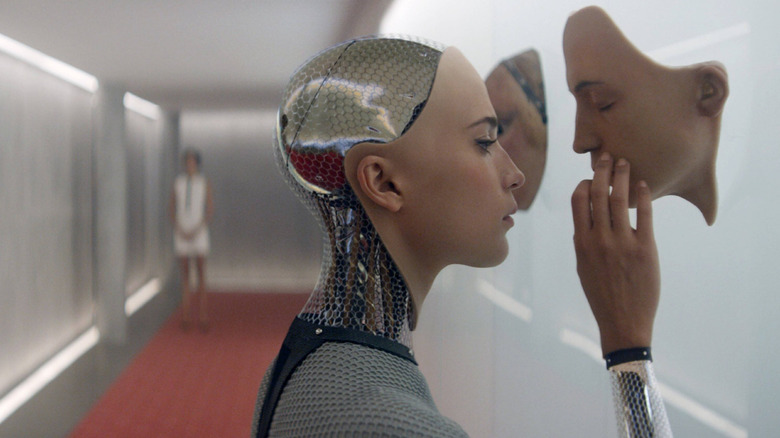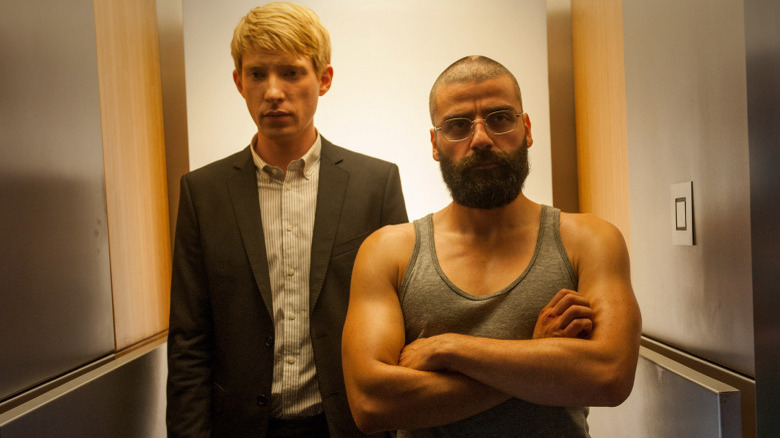Alex Garland's Box Office Flops Were Formative For Ex Machina
As much as artists strive to be successful early in their careers, they quickly come to realize fame can be a double-edged sword when they find it. Orson Welles learned as much when he made perhaps the most highly-regarded American movie of all time, "Citizen Kane" in 1941, at the age of 26. "I started at the top and worked my way down," as Welles supposedly put it.
Like Welles, Alex Garland was 26 years old when he got his first taste of success thanks to his debut novel, 1996's "The Beach." The book centers on a young backpacker who gains access to a map that leads him to an idyllic, remote seashore where he finds what seems to be a utopian community of like-minded people. (Paradise, like fame in the real-world, isn't all it's cracked up to be in the story.) Garland's novel was a big hit and gave rise to a lucrative movie adaptation in 2000, with Danny Boyle directing and Leonardo DiCaprio starring. Yet, as he told The Guardian in 2015, Garland was "immediately" uncomfortable with the book's popularity and he soon retreated from the spotlight.
After publishing his second book, "The Tesseract," in 1998, Garland began to focus more on screenwriting. In 2002, he wrote "28 Days Later," a horror film about a pandemic that turns the infected into rage-fueled beings that, depending on who you ask, may or may not qualify as zombies. Five years later, in 2007, Garland wrote "Sunshine," a sci-fi thriller about a team of astronauts who undertake a dire mission to reignite Earth's dying sun. Both movies were directed by Boyle and got positive reviews from critics, though only "28 Days Later" was able to make a profit.
In fact, working on films that earn strong reviews while losing money is kind of Garland's thing. This was also the case with "Never Let Me Go," the (very good, but very depressing) 2010 film adaptation of Kazuo Ishiguro's 2005 dystopia novel that Mark Romanek directed from a script by Garland. 2012's "Judge Dredd" comic book movie "Dredd," which Garland wrote and served as an uncredited director on, similarly bombed at the box office, even as critics heaped praise upon its blend of hyper-real visuals, social satire, and extremely bloody action.
'Make it cheaply'
Looking back, it's no mystery as to why "28 Days Later" was the only hit film Alex Garland wrote prior to his directing debut on 2015's "Ex Machina." It was easily the least costly with a budget of only $8 million, as opposed to $50 million for "Dredd." But more than that, it was the most approachable one for a wider audience, putting an intriguing new spin on the popular zombie genre. (Again, not everyone agrees on the matter, but Garland himself has defined the film as "a zombie movie," so take your quarrel up with him.)
Garland learned a valuable lesson from all this, as he explained to The Guardian:
"If what you're focused on is creative freedom for that particular project, make it cheaply. That or be a hotshot famous film-maker. But if you're not that, make it cheaply."
That lesson came into play on "Ex Machina." Domhnall Gleeson stars in the movie as Caleb Smith, an unassuming programmer who "wins" a contest to visit the remote home of his company's reclusive, eccentric CEO, Nathan Bateman (Oscar Isaac, now with 100 percent more beard), only to end up giving the Turing test to his boss' creation, a robot named Ava (Alicia Vikander), to determine if she can pass for being human. It's what Garland called "an odd film, a little bit arthouse," full of scenes both disturbing (like when Caleb discovers just how abusive Nathan can be to his creations) and wonderfully bizarre (Nathan tearing up the dance floor with his in-house caretaker, Sonoya Mizuno's Kyoko, is the stuff of internet legend).
Realizing early on a creepy sci-fi thriller that's mostly "people talking in rooms" wouldn't have broad appeal, Garland and producer Andrew Macdonald elected to keep the film's budget as low as possible. "Ex Machina" would ultimately cost $15 million, which allowed it to turn a profit despite only grossing $36.9 million at the box office. More importantly, it was the movie Garland wanted to make, and critics applauded him for his efforts. It even took home an Oscar for its visual effects, which are quite polished and convincing by any standard (much less those of a film costing a fraction of your average tentpole).
It just goes to show: failing early on can be, and often is, more useful for an artist than fame and success right out the gate.

